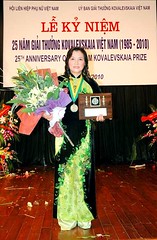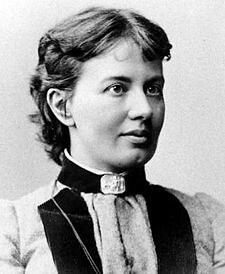 Prof Dr Le Thi Thuy, Director of the Department of Science and International Cooperation of Vietnam’s National Institute of Animal Husbandry, has been awarded the 2009 Kovalepskaia Award in recognition of her role as a woman scientist working on conservation of indigenous livestock breeds. The award is named after Sophia Kovalepskaia, an eminent 19th-century Russian mathematician. Thuy is serving as the national project director in Vietnam of a multi-national project scientists are leading at the International Livestock Research Institute (ILRI) to help conserve the indigenous farm animal genetic resources of Asia. This project is funded by the Global Environment Facility. The Alexander Von Humboldt Foundation of Germany bestows a bi-annual Sofia Kovalevskaya Award to promising young researchers from all fields. From Wikipedia: Sofia Kovalevskaya, 1850–1891, was the first major Russian female mathematician, responsible for important original contributions to analysis, differential equations and mechanics, and the first woman appointed to a full professorship in Northern Europe. Despite her obvious talent for mathematics, she could not complete her education in Russia. At that time, women there were not allowed to attend the universities. To study abroad, she needed written permission from her father (or husband). Accordingly, she contracted a "fictitious marriage" with Vladimir Kovalevsky, then a young paleontology student who would later become famous for his collaborations with Charles Darwin. They emigrated from Russia in 1867. In 1869, Kovalevskaya began attending the University of Heidelberg, Germany, which allowed her to audit classes as long as the professors involved gave their approval. Shortly after beginning her studies there, she visited London with Vladimir, who spent time with his colleagues Thomas Huxley and Charles Darwin, while she was invited to attend George Eliot's Sunday salons. There, at age nineteen, she met Herbert Spencer and was led into a debate, at Eliot's instigation, on ‘woman's capacity for abstract thought’. This was well before she made her notable contribution of the ‘Kovalevsky top’ to the brief list of known examples of integrable rigid body motion. After two years of mathematical studies at Heidelberg, she moved to Berlin, where she had to take private lessons, as the university would not even allow her to audit classes. In 1874 she presented three papers—on partial differential equations, on the dynamics of Saturn's rings and on elliptic integrals—to the University of Göttingen as her doctoral dissertation. This earned her a doctorate in mathematics summa cum laude, bypassing the usual required lectures and examinations. She thereby became the first woman in Europe to hold that degree. Her paper on partial differential equations contains what is now commonly known as the Cauchy-Kovalevski theorem, which gives conditions for the existence of solutions to a certain class of those equations. In 1889 she was appointed Professorial Chair holder at Stockholm University, the first woman to hold such a position at a northern European university. After much lobbying on her behalf (and a change in the Academy's rules), she was granted a Chair in the Russian Academy of Sciences, but was never offered a professorship in Russia. Kovalevskaya died of influenza in 1891 at age forty-one.
Prof Dr Le Thi Thuy, Director of the Department of Science and International Cooperation of Vietnam’s National Institute of Animal Husbandry, has been awarded the 2009 Kovalepskaia Award in recognition of her role as a woman scientist working on conservation of indigenous livestock breeds. The award is named after Sophia Kovalepskaia, an eminent 19th-century Russian mathematician. Thuy is serving as the national project director in Vietnam of a multi-national project scientists are leading at the International Livestock Research Institute (ILRI) to help conserve the indigenous farm animal genetic resources of Asia. This project is funded by the Global Environment Facility. The Alexander Von Humboldt Foundation of Germany bestows a bi-annual Sofia Kovalevskaya Award to promising young researchers from all fields. From Wikipedia: Sofia Kovalevskaya, 1850–1891, was the first major Russian female mathematician, responsible for important original contributions to analysis, differential equations and mechanics, and the first woman appointed to a full professorship in Northern Europe. Despite her obvious talent for mathematics, she could not complete her education in Russia. At that time, women there were not allowed to attend the universities. To study abroad, she needed written permission from her father (or husband). Accordingly, she contracted a "fictitious marriage" with Vladimir Kovalevsky, then a young paleontology student who would later become famous for his collaborations with Charles Darwin. They emigrated from Russia in 1867. In 1869, Kovalevskaya began attending the University of Heidelberg, Germany, which allowed her to audit classes as long as the professors involved gave their approval. Shortly after beginning her studies there, she visited London with Vladimir, who spent time with his colleagues Thomas Huxley and Charles Darwin, while she was invited to attend George Eliot's Sunday salons. There, at age nineteen, she met Herbert Spencer and was led into a debate, at Eliot's instigation, on ‘woman's capacity for abstract thought’. This was well before she made her notable contribution of the ‘Kovalevsky top’ to the brief list of known examples of integrable rigid body motion. After two years of mathematical studies at Heidelberg, she moved to Berlin, where she had to take private lessons, as the university would not even allow her to audit classes. In 1874 she presented three papers—on partial differential equations, on the dynamics of Saturn's rings and on elliptic integrals—to the University of Göttingen as her doctoral dissertation. This earned her a doctorate in mathematics summa cum laude, bypassing the usual required lectures and examinations. She thereby became the first woman in Europe to hold that degree. Her paper on partial differential equations contains what is now commonly known as the Cauchy-Kovalevski theorem, which gives conditions for the existence of solutions to a certain class of those equations. In 1889 she was appointed Professorial Chair holder at Stockholm University, the first woman to hold such a position at a northern European university. After much lobbying on her behalf (and a change in the Academy's rules), she was granted a Chair in the Russian Academy of Sciences, but was never offered a professorship in Russia. Kovalevskaya died of influenza in 1891 at age forty-one. 
ILRI news
Better lives through livestock
